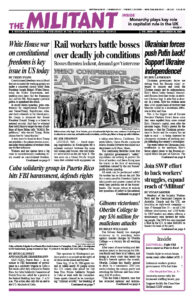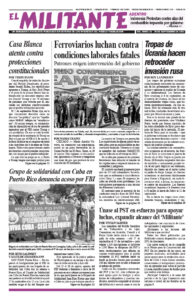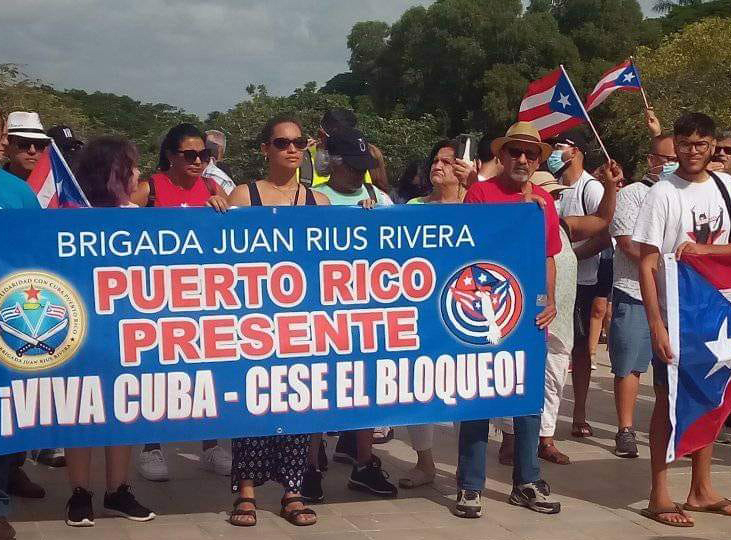SAN JUAN, Puerto Rico — In response to FBI harassment of participants in a solidarity brigade to Cuba a few weeks after they returned to Puerto Rico, the Cuba Solidarity Committee of Puerto Rico has called for a protest at the Federal Building here Sept. 17 at 11 a.m. The action also calls for an end to the U.S. blockade of Cuba.
This operation by Washington’s political police is an assault on the rights of all those on the island and beyond.
From Aug. 23 to 26, FBI agents visited or called nearly 60 people across this U.S. colony who joined the July Juan Rius Rivera Solidarity Brigade to Cuba or work with the committee. Some agents claimed to be investigating “criminal activity,” the breaking of an unnamed “federal law” or Cuban security “infiltration.” Two pro-Cuba activists in the U.S. were also called by the FBI asking about the Puerto Rican brigade.
The FBI harassment is “a clear signal that our activism has had a positive effect,” noted a Sept. 8 solidarity committee statement.
As soon as Milagros Rivera, president of the Cuba Solidarity Committee, learned what the FBI was doing, she sent out an alert, reminding everyone that there is no reason, legal or otherwise, to answer any questions from the FBI.
“The FBI is an instrument to perpetuate colonialism in our country,” Rivera said. “They are trying to intimidate and frighten us and to criminalize our solidarity with Cuba.”
Washington seized Puerto Rico, Guam and the Philippines, and placed troops in Cuba, after it defeated the Spanish rulers in its first imperialist war in 1898. U.S. control over Puerto Rico was later upheld by the U.S. Supreme Court, which ruled that “insular laws” passed by Congress meant constitutional protections that are not “fundamental” don’t apply here, because it is a U.S. colony. Puerto Rico has its own Constitution including a watered-down Bill of Rights, which does include freedom of speech, press and assembly.
When WAPA-TV News called the San Juan office of the FBI about the visits, an FBI spokesperson refused to comment, claiming that the FBI only investigates “violations of federal law” and does not target people because of their politics or beliefs.
But that’s a bald-faced lie.
The FBI has a long history of going after trade unionists, working-class political parties, Black rights activists and opponents of U.S. government policy in the U.S. and Puerto Rico.
FBI agents were sent here in 1936 after a local U.S. attorney complained to FBI Director J. Edgar Hoover that Nationalist Party leader Pedro Albizu Campos was publishing “articles insulting the United States” and giving “public speeches in favor of independence.”
In 1937 Albizu and other Nationalists were railroaded to prison on charges of conspiring to overthrow the U.S. government, despite no evidence that they had committed a single illegal act.
When the U.S. rulers entered World War II, Washington offered Albizu and other Nationalists their freedom if they would agree to suspend all pro-independence activity during the war. They refused.
Impact of the Cuban Revolution
In the 1960s the U.S. government launched Cointelpro — Counter Intelligence Programs — that targeted the political activities of millions of people in the U.S., including the Socialist Workers Party. Its 37 disruption operations in Puerto Rico were among the largest FBI Cointelpro campaigns.
Working people in Puerto Rico were deeply impacted by the 1959 overthrow of the U.S.-backed dictatorship of Fulgencio Batista in Cuba. As several activists in the movement told the Militant during a Sept. 4-6 reporting trip, the victory of the Cuban revolutionary movement, led by Fidel Castro, showed that it is possible to win real independence and to make a socialist revolution.
Washington and the FBI gave the green light to counterrevolutionary Cuban groups in Puerto Rico to go after supporters of the revolution here.
One case is the 1979 assassination in San Juan of Cuban-born Carlos Muñiz Varela, a founder of the magazine Areíto and of the Antonio Maceo Brigade. The brigade was formed by young Cubans in the U.S. and Puerto Rico who fought for normalization of relations between Washington and Havana.
Raúl Alzaga, a former collaborator of Muñiz, is one of those the FBI called at the end of August. As a result of the efforts of Alzaga and others over decades, thousands of pages of FBI documents have been released that prove the agency had infiltrated the Cuban counterrevolutionary groups and — at the very least — knew who the assassins were and who paid them. But no one has ever been prosecuted for the killing.
When the FBI called this time, Alzaga thought they were calling to let him know that more of the documents he has been seeking for decades were being released. “But then they said no, they wanted to ask me questions about Milagros Rivera,” he told the Militant. “So I told them, I had nothing to say.”
Fighting corruption?
To bolster its claim of being “nonpolitical,” the FBI’s Puerto Rico website highlights its investigations of “corruption” in the government and the union movement. This includes the arrest of a number of officials, including former Gov. Wanda Vásquez, as well as officers of the dockworkers union.
“This isn’t the first time that the FBI has intervened in the unions,” José Rodríguez, a representative of the Movimiento Solidario Sindical, told the Militant. In 2004, some 60 FBI and IRS agents raided the headquarters of the Independent Authentic Union in the middle of a strike against the government-run Water and Sewer Authority in an attempt to weaken the union. The FBI claimed they were investigating fraud in the union-run health care fund. Several union officials were framed up and imprisoned, one of whom was only released last year.
The FBI uses corruption cases like this both to go after the labor movement and to make it look as if they are defending working people, Rodríguez said. “It’s important to educate working people about the real history of the FBI.”
José Escoda, a member of the Socialist Front who works with the Cuba Solidarity Committee, made a similar point. “The FBI has created an aura that they are eliminating corrupt officials. The purpose is to show who’s really the boss here,” he said.
Escoda was one of those the FBI has approached about the Cuba brigade. “Some people think they can ‘explain’ things to the FBI, but if you talk to them, they will win,” Escoda said. “I didn’t even give them a chance to mention Cuba or the brigade. I didn’t let them ask me a single question.”
The Cuba Solidarity Committee is asking for messages of protest against the FBI’s harassment from opponents of the U.S. embargo of Cuba, trade unions, defenders of civil liberties and others. Send them to cscpr2020@gmail.com.


